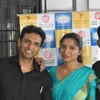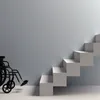Meet the 26-year-olds who turned a college project into a startup that is empowering the deaf
Founded by industrial designers Nupura Kirloskar and Janhavi Joshi, Bleetech Innovations offers a digital platform for the deaf to learn better. Blee TV, a free mobile app and web portal, provides access to useful and informative content while BleeTV Library is curated specifically for children.
Eleven-year-old Sanket Bidkar, a Class 6 student at Red Cross Society School for the Deaf, Pune, is diligent and resolute in all his pursuits. However, when it came to learning English, he used to face many difficulties, right from the pronunciation and comprehension to grammar and vocabulary.
When Sanket came across Blee TV Library, a digital platform that offers content in sign language, he was thrilled. And, once he started using its features on a regular basis, he observed significant improvements in his communication. He explains,
“I became familiar with many words in due course of time after using Blee TV Library. Putting together different phrases to make complete sentences started to seem easy too. Most importantly, my grades in English kept getting better, thanks to Blee’s well-depicted content.”
Just like Sanket, thousands of deaf students are now benefiting from this platform hosted by Pune-based startup Bleetech Innovations.

Children with hearing impairment consume content on BleeTV Library.
Founded by 26-year-old industrial designers Nupura Kirloskar and Janhavi Joshi in 2015, Bleetech focuses on breaking barriers between the hearing-enabled and the deaf by leveraging design and science. Their key offerings are two technological interventions: BleeTV, a free Android mobile application and web portal hosting a pool of content in Indian Sign Language (ISL), and BleeTV Library, which is a similar platform with content curated especially for children.
Speaking to SocialStory, Nupura, Co-founder, Bleetech Innovations, highlights that the deaf community tends to face several unique challenges on a daily basis when it comes to cognizance and communication. She says,
“Keeping pace with people’s word play and expressions, constantly gazing to lip read in the absence of sign language, and navigating the give-and-take of communal interactions tends to restrict their learning curve. Some of them overcome these but many lag. This has an adverse effect on their career and future. The goal of Bleetech Innovations is to avert such scenarios.”
A dance performance opens a door
There are 29 lakh people in India who are differently-abled, according to the 2011 Census. Of this number, around 12.6 lakh have a hearing impairment of one form or the other. In the four years of its existence, Bleetech has already impacted the lives of over 12,000 deaf individuals through its digital platforms, and is now looking to reach out to a large section of the deaf community.
It all started when Nupura and Janhavi, classmates in the industrial design course at MIT, Pune, happened to watch a dance performance by a group of deaf students.
“Both of us were in awe watching their synchronised moves despite not being able to hear a single beat of the music. That was when we developed an interest in understanding the needs of people with hearing impairment. During the course of our research, we found that the deaf usually relate sound to vibration. Hence, we thought of using this fact to develop a device in the form of a smartwatch that can convey any sound the deaf want to get notified with,” Nupura recollects.

Jahnavi Joshi (left) and Nupura Kirloskar, the Co-founders of Bleetech Innovations.
Initially, Nupura and Jahnavi took off on the idea by designing a prototype for the watch, solely for a college project. However, their need to develop on the innovation turned out to be more long term.
The two women went on to familiarise themselves with the hurdles faced by the deaf, learnt sign language, and conducted a pilot study by interacting with the members of the deaf community.
Within a few months, they had built a working model and named it ‘Blee Watch’. Some of its key features included notifications for important sounds in a typical environment (such as the ringing of a doorbell, the cries of a baby, and a fire alarm or an alarm clock), conversion of typed text to speech, and location sharing to five emergency contacts in case of an unsafe situation.
Nupura says,
“What began as a college project bloomed into a startup after a certain period since we wanted to contribute to an inclusive society through our work. Things took a turn for the better when IIT-Bombay’s Society for Innovation and Entrepreneurship followed by Tata Trust’s Social Alpha agreed to step in as investors and incubators.”
Spreading a sense of empowerment
Since Nupura and Jahnavi did not find the Blee Watch to be commercially viable, they decided to build another offering. In 2018, they launched Blee TV, a free mobile app and web portal, on which people who are hard of hearing could gain access to useful and informative content covering financial literacy, current affairs, English language, science and technology, and self-help in sign language.

Bleetech Innovations' digital platform offers content on a variety of topics.
“Since people who have a hearing impairment find it hard to connect letters or words with sounds, their pace of reading might be slow. Besides, their hold on linguistics and comprehension is a matter of concern. Blee TV eliminates these snags. The content on the platform primarily comprises 7,000 videos, created both in-house and with the help of content collaborators, where concepts are explained in sign language. This makes for completely hassle-free learning for the deaf,” says Jahnavi, Co-founder, Bleetech Innovations.
The startup eventually developed another version of the platform, BleeTV Library, on which both the design and content is specifically curated for children. With a view to benefit as many young minds as possible, Bleetech Innovations has collaborated with seven schools in Pune, so far. Under this initiative, the schools are asked to set aside two hours every week for the children to learn from videos on the platform.
Apart from access to the content on BleeTV Library, the startup also provides one electronic tablet for every two students at these schools. The cost of subscription, covering the content and the tablets, amounts to Rs 1,800 per student every year, which is funded by the schools themselves or by individuals and organisations willing to donate.
A step towards inclusivity
The startup’s platform has gained a significant amount of traction in Pune’s schools. The Red Cross Society School for the Deaf, for instance, subscribed to BleeTV Library only a few months ago, but has seen great results already.

An interface of the BleeTV application.
Manisha Dongre, Principal, Red Cross Society School for the Deaf, says,
“The information on Blee has been very useful for our students. Many a times, even if lectures are delivered in sign language, children get distracted easily. The videos on BleeTV Library are both simple and enlightening to ensure complete engagement.”
Bleetech Innovations is planning to continue making such content and contribute to the development of an inclusive society.
“We are on the verge of extending our partnerships to schools in Maharashtra and Gujrat. Also, myself and Nupura are eyeing the creation of content to supplement academic curriculums in the near future,” Jahnavi signs off.
(Edited by Athirupa Geetha Manichandar)
(Edited by Athirupa Geetha Manichandar)










